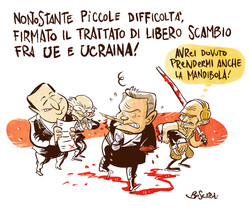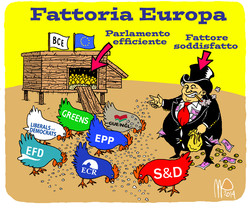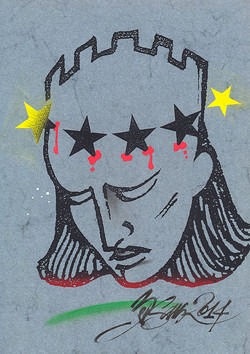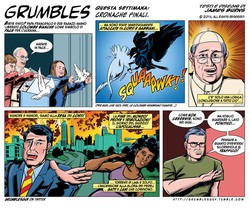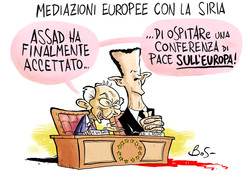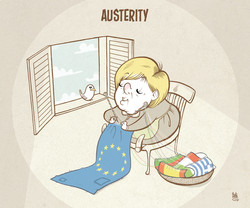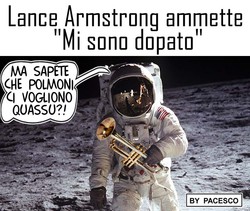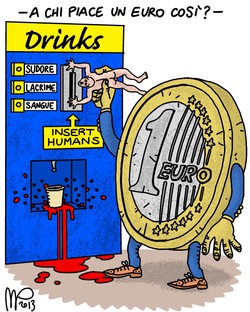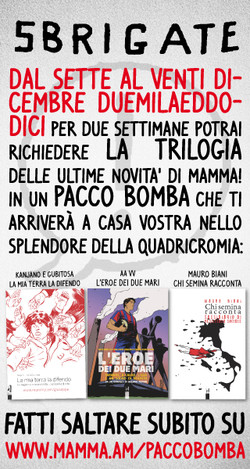The legitimate illegality. Culture as commons
Some months ago I started a journey that led me from Venice to Palermo and Catania via Rome and Naples. In these cities, in the last year, groups of knowledge workers (visual and performing art workers, researchers, technicians, cultural managers, people who work with cinema, publishing, translation, radio, journalism), but also students and citizens have occupied some theatres and spaces destined to culture.
I lived and visited these places, I interviewed the occupants, I participated to the assemblies.
In Italy the media are talking about these occupations rarely and without giving a true idea of the situation. Instead I think that what is happening is very important!
Culture as commons, precariousness, welfare, cultural policies and wasting of resources are the themes at the base of the occupations of spaces, spaces that can be considered as symbols of contradictions:
Rome – Cinema Palazzo occupied in April 2011 by a group of inhabitants of the neighborhood, citizens, activists and knowledge workers because it had to be transformed in a Casino run by organized crime. After almost 1 year of occupation the judge declared legitimate the occupation against the owner company. The occupants require a place to produce and to offer culture related not only with the neighborhood, but with the all city, like many years ago when the palace was cinema and theatre.
Rome – Valle Theatre, an historic theatre built in XVIII century, occupied in June 2011 by a group of cultural workers because it risked to be closed for the suppression of ETI (public institution that dealt with the promotion and distribution of the Italian theater, also abroad). After the closure the theatre would been managed by a private society, but the occupants claim the public property for the mission of the theatre.
Venice – Marinoni Theatre occupied in September 2011 by a group of venetian knowledge workers (who already manages two spaces in Venice: S.a.L.E. Docks and Laboratorio Occupato Morion), students and the occupants of Valle Theatre during the famous Festival of Cinema because it had been allocated 37 million euro to build the new Cinema Palace. It was only a speculation and the palace was never built, while in the same area the beautiful Marinoni Theater was crumbling to ruins.
Milan – PAC (Contemporary Art Pavilion) temporarily occupied the 3rd December 2011 by a group of Art Workers of Milan and the occupants of Valle Theatre and Marinoni Theatre to talk about culture as commons and the precariousness of the knowledge workers
Catania – Coppola Theatre, the first municipal theater in the city turned into a warehouse and closed since II World War, occupied in December 2011 by a group of Sicilian art and culture workers.
The occupants consider the occupation like a liberation of the theatre and they delivered the space with the intention to build an independent place to artistic and professional training, to share their professional skills and to turn them into material goods for the community
Naples – Madre Museum temporarily occupied the 29th January 2012 by a Neapolitan collective of performing art and immaterial workers and by the occupants of Valle, Marinoni and Coppola Theatres and the Art Workers from Milan. The occupation happened to do a public assembly about the different experiences of occupations and to talk about culture as commons also with academics and lawyers.
Naples - Ex Asilo Filangieri occupied in March 2012 by La Balena, Neapolitan collective of performing art and immaterial workers. The place is an historic palace in the centre of the city renovated with the investment of 8 million euro to be the location of the Universal Forum of Cultures in 2013. Before the event the palace is supposed to host and produce cultural events, but after the opening it was no longer used except as a place of some administrative offices of the Forum.
Palermo – Garibaldi Theatre , built in XIX century, that has always alternated periods of use and disuse (until becoming a venue for illegal boxing matches). It restored in 2008 with the investment of 4,5 million euro, but inexplicably closed. It has occupied in April 2012 by a group of Sicilian knowledge workers, the occupants of Coppola and Valle Theatre.
Milan – Torre Galfa, an abandoned skyscraper symbol of financial speculation in the city, occupied in May 2012 by a group of Art Workers, called Macao, with the support of all the others occupied spaces on order to create a cultural center. After ten days the skyscraper was cleared out. So the occupants have entered in Palazzo Citterio, an historic palace in the center if the city, but aldo this place was cleared out.
These spaces are symbols of a catastrophic cultural policies and of the rhetoric of creative cities and large-scale events in a time when social policies make work and life extremely difficult, not only for knowledge workers.
If there are no economic resources and the funds to culture production are cut, why are millions of euros allocated to restore a theater that will never be in use?
If there are no economic resources, why does the Biennale have the money to pay the rent of the buildings on the Grand Canal for the exhibitions, while their workforce is made by workers unpaid or underpaid (a lot of them doing internships)?
the protest and the counter – proposal
in the so-called "knowledge based economy" of course it is knowledge workers who produce the key-value of economic performance, but this value is not equitably redistributed: precariousness affects knowledge workers. But this happens also because the Italian legislative system and the current welfare system penalize the knowledge workers.
Interviews revealed that they have identified some "capture systems" of their value, beyond the legal system: unpaid internships, cultural policies based on the rhetoric of the creative city and great events, creative industries.
And so is from these symbolic spaces the occupants protest against cultural policies, in particular against the financing procedures, the carelessness of spaces and ask a new welfare system.
With the help of lawyers and economists it is developing a proposal of welfare and they are also designing and testing new forms of legislation and administration of the spaces in which culture is understood as commons. It is an hard work based also on a careful study of the Italian Constitution to find some ways to legitimate these illegitimate occupations (and the article 43 seems to be a good way, but it is too long to explain here).
What the occupants define culture as commons is the need for a broader participation of citizens and workers in cultural policies and more transparency in the allocation of funding.
The experimental forms of legislation, governance and management of the spaces, sharing of means of production mentioned above could be tools to begin this new era.
The groups of occupants recognize a similarity with the Arab spring, the Occupy movement, the Spanish Indignados, but In Italy these groups form a network, not a movement. They defined themselves "constituent groups" i.e. they don’t aspire to be a minority, but they aspire to have a large representation of citizenship, to combine advanced forms of conflict with the ability to build consensus and participation by different parts of population.
And indeed the citizen participation to the assemblies and to the occupations is large. There are also people that would never have thought of entering an occupied space.
The participation is broader especially since the reform of labor law in Italy, proposed after Berlusconi's government, puts in the same legislative situation of the knowledge workers also all the independent workers and who hasn't a contract of indefinite duration.
The occupants specifically want: a new labor law and a new welfare system inspired by the right of citizenship (formulated by Balibar) and by the specific indemnity for intermittent work of French system of welfare; they want open data on public funding, transparency in the appointment of artistic directions, real participation in public policy and in decision making related to their field
They think that arts, culture, education, generically knowledge should not be based on the production of economic wealth, because they are the foundation for building and for developing an healthy and informed community, then the State can' t fund paying attention only to the economic return.
Relations with Institutions
it is requested to the institutions to share part of their power so that culture as commons can function as devices for the diffusion of participation and of decisional power. This could be also a service to the Institutions so busy that is impossible consider every problem of the citizens and of the city.
It is requested to the institutions to reduce waste (like investments to build new spaces and great events) and promote artistic talents.
The public administration are alternating between indifference (Catania), attempts at dialogue and attempts to encapsulation (Naples, Rome, Venice). But in this year of occupations in all the cities there were no violent fights with the police.
What are they doing inside the occupied spaces?
Public assemblies alternate with roundtables of inquiry on the conditions of knowledge workers, on culture as commons, on formulation of proposals for the management of these spaces and on the formulation of the job counter-reform as opposed to the one currently being discussed.
Meanwhile, every day these spaces are clean, open and alive with a varied, continuous, hybrid programmation, accessible to all with the help of all the artists and workers, including some of great fame: workshops, performances of all kinds, Sundays for children, after-school care for children (in Sicilian spaces), the barter markets (Naples), seminars on copyleft and creative commons, a desk to legal support and business planning support (Coppola Theatre), history lessons (Nuovo Cinema Palazzo), readings, projections, trump tournaments in the summer for the elderly (Nuovo Cinema Palazzo).
At the Teatro Valle are now numerous the residences and the weekly artistic directions with exchanges also between the occupied spaces.
Dancers, actors, lawyers, architects and all other knowledge workers are working together in workshops, on stage, experimenting and even putting the lime in the walls as is especially in the Coppola Theatre.
All this combined with a social commitment that goes outside the space occupied: from demonstrations, to the campaign #savecyclists to the one against the privatization of water.
and then there is what the Coppola Theatre call 'social co-operation' as the "liberation" of a playfield for football and rugby made by the occupants of the Coppola Theatre and the association Iqbal Masih Librino working for years in one of the worst neighborhoods of Catania with inhabitants and especially children, by providing social services and basing the social inclusion of children especially on sport. it had been asked to the administration to clean up and leave that playground to the association, they also collected signatures on a petition, but to the Public Administration indifference they responded with another "liberation" illegal but legitimate.
All the income from subscriptions or bar as the only sources of funding of these spaces, for activity and works on the structure.
Valle Theatre is formulating a statute participated for the first foundation established for the management of commons.
Participation, citizenship and neighborhood
The participation, especially of the inhabitants of the neighborhood, is related to the different conditions of the places and also of their neighborhoods: the Nuovo Cinema Palazzo, Marinoni Theatre and Coppola Theatre are located in working class neighborhoods and so the participation of the inhabitants is so strong, also for the reconstruction of the places in worst conditions. Instead a process of gentrification is going on in near Valle Theatre in Rome and in Naples near Ex Asilo Filangieri (now called Knowledge and Creativity Asylum), both in perfect structural conditions.
In Catania a lot of people didn’t know the existence of the Coppola Theatre, but in Catania there is an amazing participation in reconstruction: materials, work from people of the neighborhood, also from professional plumbers and masons. And now the inhabitants brought also collections of records and a man brought also a gramophone.
I think that bringing personal objects is a symbol of recognition that the theatre is a place of culture, but a place of all the inhabitants.
But everywhere it is evident the awakening of the district. The first person I met in Nuovo Cinema Palazzo is Adele, a woman of more or less 80 years old who was the conductress of the Cinema and is one of the occupant; often on Sunday in the Valle Theatre arrived pies baked by neighbors who also participate to the occupation doing cleaning or host committees or also every week-end there are guided tours of the theatre and a lot of Roman citizens entered in the theatre for the first time in their life during the occupation; the Sunday for children in Knowledge and Creativity Asylum (Naples) or in Nuovo Cinema Palazzo with clown are always crowded (children in occupied spaces!!!)
Social and cultural value of “illegal” spaces
I asked the occupants as you might quantify the social and cultural value that they are producing. They haven't even found a way that would make quantitatively the value produced, but everyone agrees that finding a way to quantify it can be useful to legitimize their illegal actions and it will probably make it even easier to request the negotiation of a new labor law and a new welfare system.
The social and cultural value is produced because these spaces have become places of artistic and sociological research and experimentation, places where we take care of his own cities and citizens, places where you implement new social policies based on co - operation and identification of real urgencies.
In these spaces the artists and workers of different disciplines are experimenting new collaborations, as well as in the New Palace Cinema there is a permanent laboratory of juggling and clowning, a discipline that has no place in academia.
How to quantify the value produced by experimentation? With what has been cut off funding for culture?
How do you quantify the actions of social cooperation? What is the value of a clean playground for children of Catania? how to quantify the effects of the new sociality that is created?
There are people of all ages that somehow make their own space and live together.
How do you quantify the restoration and the maintenance of the spaces?
How do you quantify the value of the knowledge produced about the formulation of new legislative and management tools? How to quantify the legal counseling and the business planning support? with the fees that would ask the consultant?
What is illegitimate in the face of indiscriminate cuts, neglect, indifference?
Final cuts and a new vocabulary
At the end of this journey I have a little new activist vocabulary in which "occupy" means "taking care" and "commons" are places for construction of other economies and pure forms of cooperation and sociality, other forms of government, new forms of social enterprises.
I think it's obvious how to deal with the degradation in the cities, the restrictive ordinances give poor results compared to open a space for culture, of everybody, completely multifunctional.
But we must understand how to keep alive and active in the long term these activities and these spaces to avoid the risk of self-exploitation
I don't know if the new type of foundation that the Valle Theater is founding, with the popular shareholding to support the foundation, can be a solution.
Each group has a strong identity related to his own territory so I guess it's hard to find a single solution for all the same, but you should still focus on the strength of the network that is increasingly widening, thanks to the incorporation of workers with different skills and thanks to the liberation of spaces in different cities almost as if there was a viral infection.
Se vuoi sostenere questo sito, Richiedi uno dei nostri libri e combatti con noi il degrado culturale.



